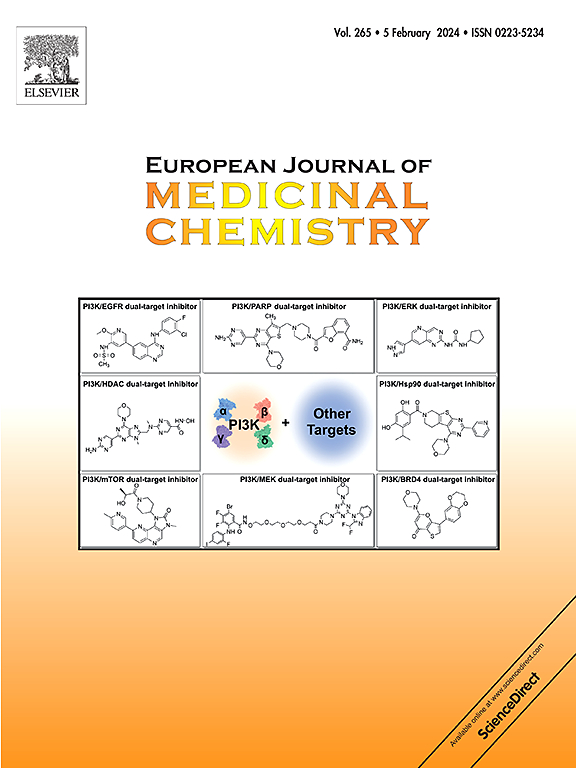Discovery of potent, selective human TLR1/2 agonists: N-quinoline-N'-(thiophen-2-yl)thiourea analogs for potential cancer immunotherapy
IF 6
2区 医学
Q1 CHEMISTRY, MEDICINAL
引用次数: 0
Abstract
TLR2 agonists represent promising cancer immunotherapeutic due to their unique combination of potency and safety. SMU-C68, a human TLR1/2 specific small molecule agonist was identified, exhibiting a remarkable four-fold increase in biological activity compared to previously reported SMU-C80 with enhanced aqueous solubility. The cellular and protein level results confirmed that SMU-C68 facilitated the dimerization of TLR1 and TLR2 proteins, leading to the specific activation of TLR1/2 heterodimers. Upon activation, TLR2 recruited the adaptor protein MyD88, initiating downstream NF-κB signaling pathway. Moreover, treatment with SMU-C68 induced the release of pro-inflammatory factors, such as TNF-α and IL-1β, in human PBMC cells. Notably, SMU-C68 exhibited good selectivity towards human species and showed minimal effects on murine cells. Furthermore, in vitro co-culture experiments demonstrated that SMU-C68 exerted a positive influence on immune cell activation and tumor cell apoptosis. These findings strongly emphasize the potential of SMU-C68 in modulating immune responses and eliciting anti-tumor activity.


发现有效的,选择性的人类TLR1/2激动剂:n-喹啉- n '-(噻吩-2-基)硫脲类似物用于潜在的癌症免疫治疗
TLR2激动剂由于其独特的效力和安全性组合而成为有前途的癌症免疫治疗药物。SMU-C68是一种人类TLR1/2特异性小分子激动剂,与之前报道的SMU-C80相比,SMU-C68的生物活性显著提高了4倍,水溶性增强。细胞和蛋白水平的结果证实SMU-C68促进了TLR1和TLR2蛋白的二聚化,导致TLR1/2异源二聚体的特异性激活。激活后,TLR2募集接头蛋白MyD88,启动下游NF-κB信号通路。此外,SMU-C68治疗诱导人PBMC细胞释放促炎因子,如TNF-α和IL-1β。值得注意的是,SMU-C68对人类物种具有良好的选择性,对小鼠细胞的影响最小。此外,体外共培养实验表明SMU-C68对免疫细胞活化和肿瘤细胞凋亡有积极影响。这些发现强烈强调了SMU-C68在调节免疫反应和激发抗肿瘤活性方面的潜力。
本文章由计算机程序翻译,如有差异,请以英文原文为准。
求助全文
约1分钟内获得全文
求助全文
来源期刊
CiteScore
11.70
自引率
9.00%
发文量
863
审稿时长
29 days
期刊介绍:
The European Journal of Medicinal Chemistry is a global journal that publishes studies on all aspects of medicinal chemistry. It provides a medium for publication of original papers and also welcomes critical review papers.
A typical paper would report on the organic synthesis, characterization and pharmacological evaluation of compounds. Other topics of interest are drug design, QSAR, molecular modeling, drug-receptor interactions, molecular aspects of drug metabolism, prodrug synthesis and drug targeting. The journal expects manuscripts to present the rational for a study, provide insight into the design of compounds or understanding of mechanism, or clarify the targets.

 求助内容:
求助内容: 应助结果提醒方式:
应助结果提醒方式:


